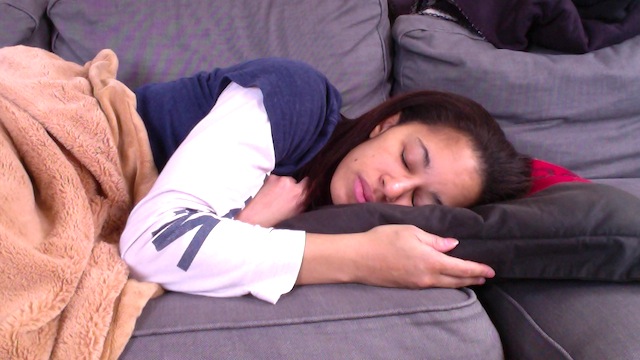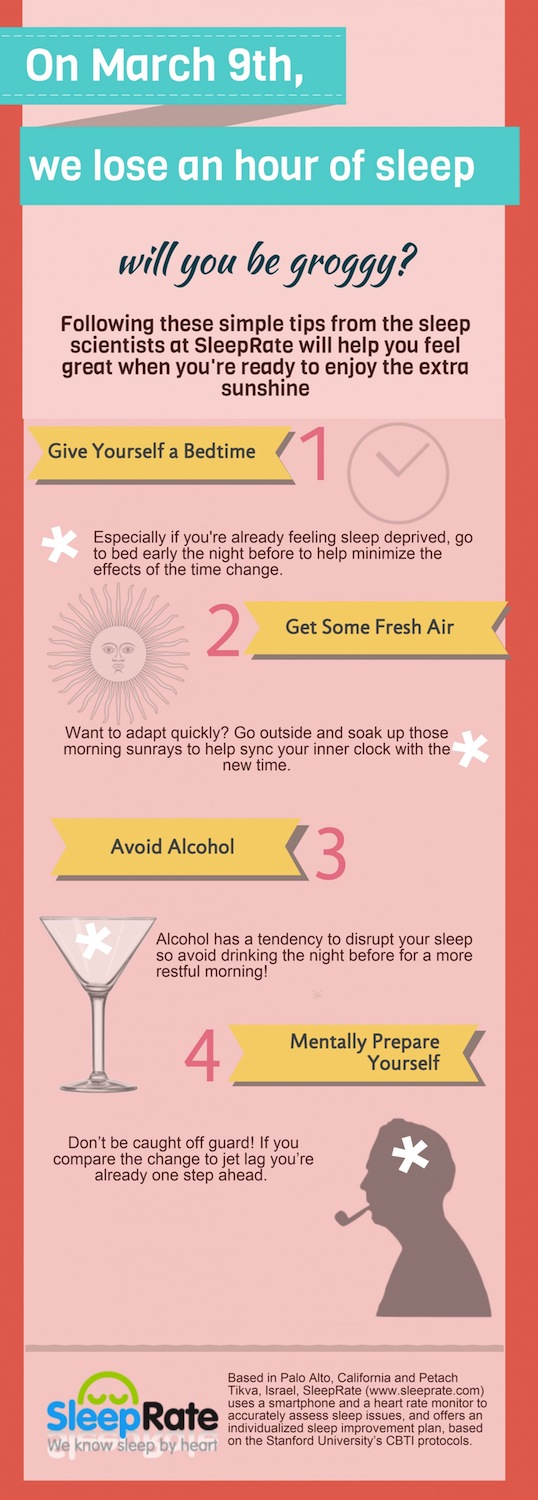 In the wee hours of Sunday, March 9, it will be time to change the clocks once again. At 2 a.m. most of the states in the country spring ahead. While the morning birds—which I have miraculously become after a lifetime of being a night owl—lose an hour of light in the morning, we can all enjoy the extra hour of daylight in the evening. More sunlight boosts serotonin, our “happiness hormone,” which few would complain about. Unfortunately, Daylight Saving Time (DST) can wreak havoc on your health and sleep.
In the wee hours of Sunday, March 9, it will be time to change the clocks once again. At 2 a.m. most of the states in the country spring ahead. While the morning birds—which I have miraculously become after a lifetime of being a night owl—lose an hour of light in the morning, we can all enjoy the extra hour of daylight in the evening. More sunlight boosts serotonin, our “happiness hormone,” which few would complain about. Unfortunately, Daylight Saving Time (DST) can wreak havoc on your health and sleep.
DAYLIGHT SAVINGS TIME EFFECTS ON HEALTH
“The Monday and Tuesday after moving the clocks ahead one hour in March is associated with a 10 percent increase in the risk of having a heart attack,” said UAB Associate Professor Martin Young, Ph.D., in the Division of Cardiovascular Disease, in Science Daily. “The opposite is true when falling back in October. This risk decreases by about 10 percent.”
Young added, “Sleep deprivation, the body’s circadian clock and immune responses all can come into play when considering reasons that changing the time by an hour can be detrimental to someone’s health.”
Every cell in the body, including immune cells, has its own “clock,” Young said, to help it anticipate and prepare for something that is about to happen. “When there is a shift in one’s environment, such as springing forward, it takes a while for the cells to readjust,” he said. “When time moves forward, cell clocks are anticipating another hour to sleep that they won’t get, and the negative impact of the stress worsens; it has a much more detrimental effect on the body.”
Naturally, night owls have a more difficult time than morning birds with DST, especially when sleep-deprived. Sleep deprivation, according to Young, can alter inflammatory response, which can contribute to a heart attack.
Sleep deprivation also increases production of the hormone ghrelin, which helps to regulate hunger. When ghrelin increases, so do cravings and the desire to eat more.
Less hours of sleep also means less time for the body to reenergize and recuperate from the day.
However, some feel that an hour time change is nothing to worry about.
SLEEP DEPRIVATION IN AMERICA
“One hour variation is not a big deal,” says Dr. Safwan Badr, president of the American Academy of Sleep Medicine and chief of pulmonary, critical care, and sleep medicine at Wayne State University, in TIME.com. “It’s not a major factor if you have healthy sleep habits; you have enough physiological reserve to make the adjustment.”
Unfortunately, most of us don’t have healthy sleep habits. According to the National Sleep Foundation, while 22 percent have trouble falling asleep every, or nearly every, night. Women are more likely to report insomnia than men. The older you are, the more likely you’ll report insomnia than younger folks.
We watch TV and use our smartphones in bed, instead of preserving it for sleep and hanky-panky—and maybe a short period of reading. We don’t go to bed at the same time every night. We have caffeine in the late afternoon and night. We drink too much alcohol. We eat heavy (and spicy) foods before bedtime. We stress over the day at bedtime instead of talking it over with a friend or loved one during the day or writing things out in a journal (or to-do list) in the daytime, or meditating to relax the mind before bedtime.
As a result, we get insufficient sleep and become less efficient at getting tasks done, make more errors and have less focus and more difficulty remembering things. We have difficulty managing our finances. We become more irritable and our quality of life drops immensely.
We also become riskier drivers. The National Department of Transportation estimates drowsy driving to be responsible for 1,550 fatalities and 40,000 nonfatal injuries annually in the United States.
Why do I say we? Well, it’s because I am one of the 22 percent who has nightly insomnia. I have onset insomnia, which means I have trouble falling sleep at all over the night. My chronic insomnia came around at the same time I began having constant pain and muscle spasms. Not being able to sleep rebounded on me, causing even more pain and spasm. It seemed a cycle I couldn’t break, until I found some help, through medication, or preferably through Yoga Nidra.
The Centers for Disease Control and Prevention (CDC) calls insufficient sleep a public health epidemic. It is estimated that 50-70 million adults in this country suffer from sleep or wakefulness disorders. According to its Behavioral Risk Factor Surveillance System Survey, those aged 18-24 and 64 and above were the most likely to unintentionally fall asleep during the day.
Regularly having trouble sleeping can cause depression and contribute to other illnesses, such as heart disease, diabetes and obesity, as mentioned earlier, as well as fibromyalgia.
Many health organizations, including The National Institutes of Health, suggest adults need 7-8 hours to function normally. A sleep study in which I took part in a Sleep and Dreams class at Stanford revealed that some need more; for example, I found that I need at least 8.5 and sometimes 9 hours of sleep to feel and function my best. The National Health and Nutrition Examination Survey (NHANES) also found that those who sleep less than its recommended 7-9 hours had more difficulty performing many daily tasks, according to the CDC.
Some need more than 8 hours and some feel just fine getting 6 hours of rest. The number of hours people need to sleep to be at their best also usually changes as they get older.
TIPS FOR GOOD SLEEP HYGIENE
For those who don’t have a medical reason, like sleep apnea, for difficulty falling or staying asleep, practicing proper sleep hygiene may completely change your night.
 SleepRate, a company that works with Stanford to help people sleep better—working with you to create a personalized sleep improvement plan via your smartphone—offers a few tips for helping to improve your sleep hygiene to prepare for the DST time change:
SleepRate, a company that works with Stanford to help people sleep better—working with you to create a personalized sleep improvement plan via your smartphone—offers a few tips for helping to improve your sleep hygiene to prepare for the DST time change:
1. Give yourself a bedtime. If you already feel sleep deprived, get a little extra sleep the night before the change to help minimize the effects of the time change. I also recommend you keep your bedtime and wake time consistent, with no more than an hour variance on the weekend.
2. Thank goodness for the sunnier weather today in Connecticut. SleepRate also recommends you get your Vitamin D to quickly adapt to the change. On Sunday, soak up the morning’s sunlight to sync your inner clock with the new time. Try opening your blinds first thing Monday to jumpstart your exposure to natural light – it will help with alertness and brain activity.
3. Avoid alcohol: minimize potential sleep disruptors such as alcohol by avoiding it the night of the change. The CDC recommends avoiding nicotine outright. I also suggest you avoid caffeine for at least six hours before bedtime.
4. Mentally prepare yourself: Compare the time change to the kind of jet lag that you’d experience when traveling to a region one hour ahead. You might lose some sleep, but if you tend to clock seven to eight hours of sleep normally, you won’t feel as groggy as normally would when operating on six hours of sleep.
Time.com also suggests eating dinner an hour earlier on Saturday to help prepare you for the time change. Going to bed earlier on Sunday, when it feels like 11 p.m. but it’s actually 10 p.m., will help decrease feeling foggy on Monday morning. Young suggests also waking up earlier than you need to on Sunday, as well as eating a good-sized breakfast.
Exercise can be helpful as well, but should be performed at least four hours before bedtime.
“Doing all of this will help reset both the central, or master, clock in the brain that reacts to changes in light/dark cycles, and the peripheral clocks—the the ones everywhere else including the one in the heart—that react to food intake and physical activity,” said Young. “This will enable your body to naturally synch with the change in the environment, which may lessen your chance of adverse health issues on Monday.”
Find more tips for year-round healthy sleep at SleepRate.com.
[…] bed 15 minutes earlier each week until you meet your desired rise time. The gradual difference will allow your body to get used to the schedule change and the small difference won’t feel like a byproduct of jetlag. Just make sure to stick to the […]